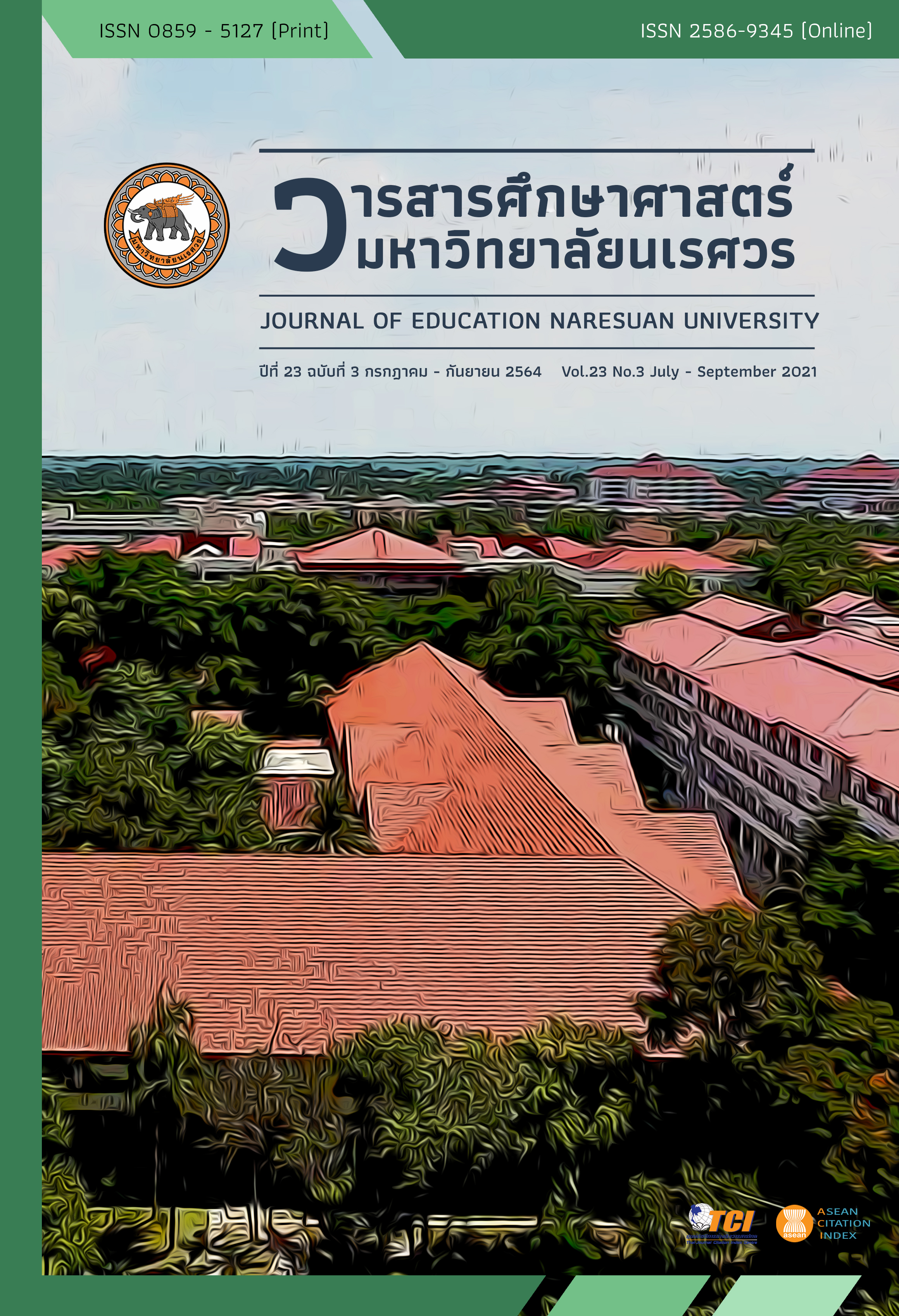SYSTEM AND DRIVE MECHANISM FOR HIGH PERFORMANCE TEACHERS DEVELOPMENT SUPPORTING THAILAND 4.0 ระบบและกลไกขับเคลื่อนระบบการพัฒนาครูสมรรถนะสูงสำหรับประเทศไทย 4.0
Main Article Content
Abstract
This research was to develop the system and the system drive mechanism for high performance teacher development supporting Thailand 4.0 by using mixed method methodology. The research procedure comprised of 2 steps; Step 1 was studied desirable state of teacher development system and system drive mechanisms by questionnaire. Informants are academics, teacher development policymakers, deans, directors of educational service area, principals and teachers in total of 86 people using purposive sampling. Step 2 was developed system and system drive mechanisms for high performance teacher development. Drafting the system and its drive mechanism using quantitative data from questionnaire in step 1. Verified the appropriateness and feasibility using focus group discussion with 22 teacher development experts using purposive sampling. Research finding was teacher development system comprised of qualitative goals and quantitative goals, main responsible agency/person were teacher education institutes, educational institutes and teachers themselves, teacher development model was a combination of on-the-job training, off- the-job training and self-study, teacher development system managed by affiliated agency of each institute in educational service area, and budget allocation should give the opportunity for educational institutions and teachers to use the budget to support individual teacher development. The drive mechanisms for teacher development system to create high performance teachers in Thailand supporting Thailand 4.0 had 2 mains mechanisms which were teacher development quality controlled mechanism and teacher development system controlled mechanism by professional organizations or teachers council setting the standards for teacher development that emphasize the development of teacher competency (Competency Based) and ability of the teachers to develop desirable characteristics of the learners (Outcome Based).
Article Details
The owner of the article does not copy or violate any of its copyright. If any copyright infringement occurs or prosecution, in any case, the Editorial Board is not involved in all the rights to the owner of the article to be performed.
References
Charoenwongsak, K. (2003). Scenario and desirable characteristic of Thais. Bangkok: Office of the National Education Commission. [in Thai]
Chongklaiklang, S., & Siribanpitak, P. (2015). Development of an administrative model for empowerment of teachers in basic education institutions. Journal of Education Graduate Study Chulalongkorn University, 7(4), 220-227. [in Thai]
Cochran-Smith, M. (2008). The new teacher education in the United States: Directions forward. Teachers and Teaching, 14(4), 271-282. https://doi.org/10.1080/13540600802037678
Dhurakijpundit University. (2013). Collection of articles of educational management in ASEAN and dialogue partners: Singapore, Brunei, Philippines, Indonesia, Vietnam, Myanmar and Laos: China, India, Japan and New Zealand. Bangkok: Dhurakijpundit University. [in Thai]
Ginsburg, M. (2011). EQUIP2 state-of-the-art knowledge in education: Teacher professional development. Retrieved February 14, 2020, from https://www.epdc.org/sites/default/files/documents/EQUIP2%20SOAK%20-%20TPD.pdf
Ministry of Foreign Affairs. (2017). Innovation in foreign country: The guidline for educational development in Singapore. Retrieved November 10, 2017, from http://www.mfa.go.th/thailand4/th/news/6909/77112-แนวทางการพัฒนาด้านการศึกษาของสิงคโปร์.html [in Thai]
Narintarangkul Na Ayudhaya, S. (2018). Paradigm, model and mechanism for area-based teacher development. Educational Management and Innovation Journal, 1(3), 82-100. [in Thai]
National Education Act. (1999). Government gazette. Vol. 116 Part 74 A. [in Thai]
OECD. (2014). Competency framework. Retrieved November 10, 2017, from https://www.oecd.org/careers/competency_framework_en.pdf
Office of the Basic Education Commission. (2019). List of courses for the development of government teachers and educational personnel teaching division of the office of the basic education commission in accordance with the criteria and methods as specified by GTEPC. Bangkok: Ministry of Education. [in Thai]
Office of the National Education Commission. (1999). National Education Act of B.E. 2542 (1999). Bangkok: Office of the National Education Commission. [in Thai]
Panthong, W., Kornpuang, A., Pakdeewong, P., & Chanbanchong, C. (2013). A model for the development of student oriented teachers in the school under jurisdiction of primary education service areas. Journal of Education Naresuan University, 15, 193-205. [in Thai]
Rabin, R. (2014). Blended learning for leadership: The CCL approach. Retrieved December 20, 2019, from http://www.ccl.org/wp-content/uploads/2015/04/BlendedLearningLeadership.pdf
Regulation of the Teachers’ Council of Thailand on Professional Ethics B.E. 2556. (2013, October 4). Government gazette. Vol. 130 Part special 130 D. [in Thai]
Sridhrungsri, P. (2014). Elevate the quality of Thai teacher in 21st century. The partnership in creating a learning society for all conference, May 6 - 8, 2014. Bangkok: Mata Karnphim Company. [in Thai]
The Partnership for 21st Century Learning (P21). (2015). Framework for 21st century learning definition, Retrieved November 10, 2017, from http://www.p21.org/storage/documents/docs/P21_Framework_Definitions_New_Logo_2020.pdf
The Secretariat of the Council of Education. (2017). System and model of teacher development suitable for Thai society and internationalization. Bangkok: Prikwarn Graphic. [in Thai]
Thongjuea, T., & Thummake, P. (2017). The guidelines for human resource development in the 21st century according to educational dimension. Journal of MCU Peace Studies, 5(3), 389-403. [in Thai]
Wangmijongmee, C., & Naiyapat, O. (2017). Teachers' competency in the 21st century: Adjusting learning, changing competencies. Journal of HR Intelligence, 12(2), 47-63. [in Thai]
Wichienpan, T., & Chansuk, P. (2013). The report of the 21st century skills development program for Thai children and youth to prepare for the ASEAN community (Research report). Bangkok: Quality Learning Foundation (QLF). [in Thai]


